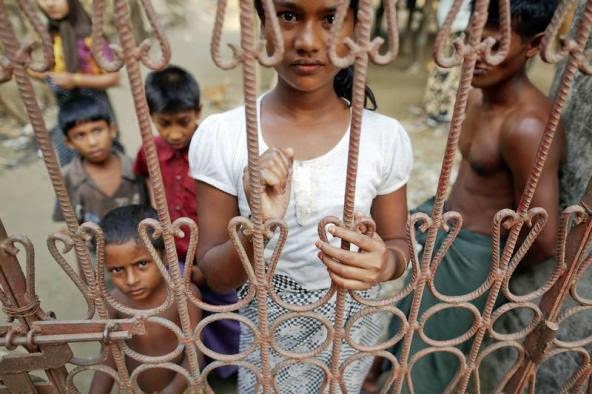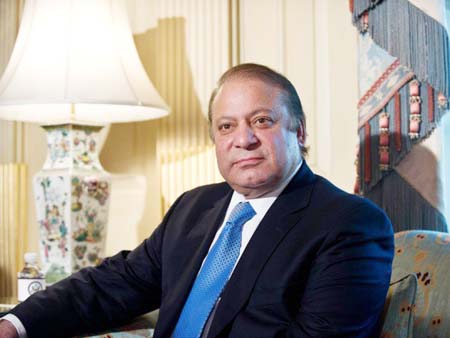Arab News
LINDA S. HEARD

The military junta may have officially been dissolved and free and fair elections held, but Myanmar’s government either supports the army’s ethnic cleansing of Rohingya Muslims, or is too fearful to stand up for the democratic values its leader Aung San Suu Kyi has always espoused.
Nobel Peace Laureate Suu Kyi, who sacrificed a normal family life and spent 15 years under house arrest due to her unremitting fight for freedom, has basked in the warmth of international admiration for decades. But now that she has succeeded in gaining some semblance of power, her halo is slipping.
Nobody could have imagined that this remarkably strong and principled woman, prepared to put her life on the line to give the voiceless a voice, would be a silent witness to her country’s massacres of Muslim men, women and children in Rakhine province, where over a million Rohingyas — forming over 90 percent of the area’s population — have been oppressed, discriminated against and rendered stateless for generations. Over 100,000 are held captive in internment camps; tens of thousands have fled to Indonesia, Malaysia and Thailand. Worse, she blames the international community and the media for stirring up divisions. Her office regularly puts out statements denying that well recorded and photographed atrocities occurred. Her defenders claim that she is forced to work within military constraints and in accordance with ultra-nationalist public opinion that is overwhelmingly anti-Muslim.
However, in a sign that she may share public sentiment, in keeping with common parlance she calls these stricken people Bengalis, banning anyone in her presence from saying the word “Rohingya.” The country’s Ministry of Culture is currently compiling “evidence” to prove Rohingyas are not a people indigenous to Myanmar, with the aim of publishing a book.
A recently published report by Amnesty International based on eye-witness accounts accuses Myanmar’s forces of slaughtering, raping and torturing civilians and burning over 1,200 homes, schools and mosques, which “may amount to crimes against humanity.” Using satellite imagery, Human Rights Watch has pinpointed three villages burned to the ground.
“It is essential that Aung San Suu Kyi, as Myanmar’s de facto leader, shows strong moral and political leadership by condemning human rights violations and committing to a genuinely impartial and independent investigation into the events of the last two months,” reads the Amnesty report. Given that reporters and NGOs are barred from entering this region in a state of virtual lockdown, Amnesty is whistling to the wind.
The UN, which terms the Rohingyas as one of the most persecuted communities on the planet, has stopped short of calling Myanmar’s actions genocide, but has referred to its behavior as “short-sighted, counterproductive and even callous,” warning that violence could spill over into neighboring countries. There is truth in that assessment.
Human beings can only be kicked for so long before they coalesce to fight back. A surge in radicalization among Rohingya youth is one factor; another is the formation of a rebel group known as Harakah Al-Yakin (The Movement of Certainty), alleged to have attacked and killed Myanmar border guards in October.
Emotions are high as far away as Pakistan. This month, thousands took to the streets of Karachi to protest Myanmar’s brutal treatment of its Rohingya communities, carrying placards that read: “Stop killing us for being Muslim.”
Days earlier, Malaysian Prime Minister Najib Razak spearheaded a similar demonstration, telling the 5,000-strong crowd that in his capacity representing 31 million Malaysians, he could not “turn a blind eye” to Rohingya suffering. He urged the UN and the Organization of Islamic Cooperation (OIC) to do more than just wait and watch. “Please don’t just see, do something,” he appealed.
Unfortunately, neither of those organizations is in a position to make any meaningful difference, as evidenced by five years of carnage in Syria. Russia has in the past sheltered Myanmar from censure at the UN Security Council. Razak has also called upon the Nobel Committee to revoke Suu Kyi’s peace prize, and has asked the ASEAN bloc to review Myanmar’s membership.
Under mounting pressure, at her request Suu Kyi met with her ASEAN counterparts in Yangon to discuss the issue on Monday — a departure for the bloc, which usually avoids getting entangled in its members’ internal problems. It is likely that she used the occasion to defend her country’s actions rather than seek genuine solutions.
With her reputation at stake, rather than be used as the benign face of Myanmar — democracy’s poster-child — without real power to her elbow, she should consider resigning to resume her role as a defender of human rights. Otherwise she could ultimately be held responsible for the cruel fate of a people whose only crime is their clamor to be free.




